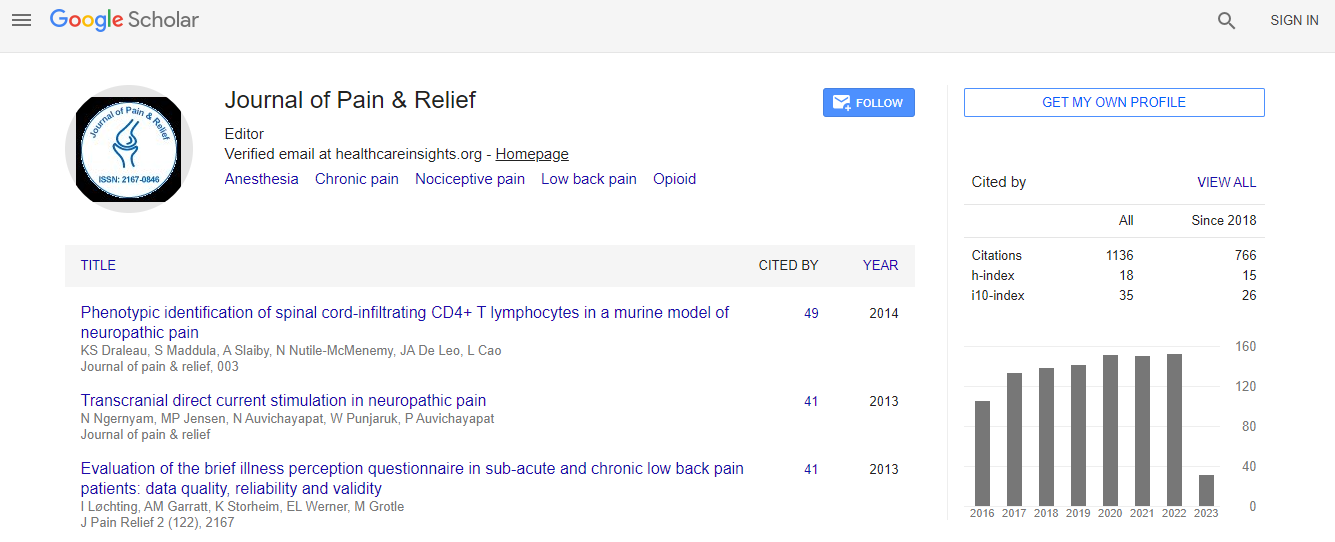Research Article
Collaborative Efforts May Improve Chronic Non-Cancer Pain Management in Asia: Findings from a Ten-Country Regional Survey
| Chi Wai Cheung1*, Chee Yong Choo2, Yong-Chul Kim3, Feng Sheng Lin4, Seong-Hwan Moon5, Evelyn Osio-Salido6, Sheng-Fa Pan7, Vivek Ajit Singh8, Seung-Hwan Yoon9, Lois Ward10, Hanlim Moon11 and Abhishek Bhagat11 | |
| 1Department of Anesthesiology, The University of Hong Kong, Hong Kong | |
| 2Novena Pain Management Centre, Mount Elizabeth Novena Hospital, Singapore | |
| 3Department of Anesthesiology and Pain Medicine, Seoul National University School of Medicine, Seoul, Republic of Korea | |
| 4Department of Anesthesiology, National Taiwan University Hospital, Taipei, Taiwan | |
| 5Department of Orthopaedic Surgery, Yonsei University College of Medicine, Seoul, Republic of Korea | |
| 6Department of Medicine, University of the Philippines - Philippine General Hospital, Manila, Philippines | |
| 7Peking University Third Hospital, Beijing, China | |
| 8University Malaya Medical Center, Kuala Lumpur, Malaysia | |
| 9Department of Neurosurgery, Inha University Hospital, Incheon, Republic of Korea | |
| 10Mundipharma Research Ltd, Cambridge, UK | |
| 11Mundipharma Pte Ltd, Singapore | |
| Corresponding Author : | Cheung CW Department of Anesthesiology The University of Hong Kong 4th Floor, K Block Queen Mary Hospital 102 Pokfulam Road Pokfulam, Hong Kong Tel: 852-2255-3303 Fax: (852)2855-1654 E-mail: cheucw@hku.hk |
| Received November 17, 2015; Accepted January 20, 2016; Published January 22, 2016 | |
| Citation: Cheung CW, Choo CY, Kim YC, Lin FS, Moon SH, et al. (2016) Collaborative Efforts May Improve Chronic Non-Cancer Pain Management in Asia: Findings from a Ten-Country Regional Survey. J Pain Relief 5:225.doi:10.4172/2187-0846.1000225 | |
| Copyright: © 2016 Cheung CW, et al. This is an open-access article distributed under the terms of the Creative Commons Attribution License, which permits unrestricted use, distribution, and reproduction in any medium, provided the original author and source are credited. | |
Abstract
Background: The objective of the ACHEON survey was to investigate current practices in chronic non-cancer pain (CNCP) management in Asia, with a focus on opioid use.
Methods: A questionnaire-based survey conducted in 10 Asian countries/regions was answered by 695 physicians managing pain (median experience: 15 years) and 1,305 patients experiencing CNCP within the preceding 3 months.
Results: Overall, 89.3% of patients reported experiencing moderate-to-severe pain (median pain duration of 24 months). Continuing pain management education of ≤10 hours was reported by 71.1% of the physicians. While approximately 80% of physicians reported quantifying pain in practice, 65.0% of patients reported that no scale was used for their pain assessment. A significant proportion of physicians (78%) perceived discordance between their patients’ actual pain level and their own evaluation. Opioids were considered necessary for CNCP management by 63.6% of physicians. However, while non-opioid oral medication was prescribed to 66.8% of patients, only 4.4% of patients were prescribed opioids. CNCP was reported to affect activities of daily living for 80.8% of patients. Physicianperceived barriers to optimal therapy included patients’ reluctance to use opioids owing to fear of adverse effects (65.0%) and addiction (64.9%), while physicians’ reluctance to prescribe opioids (63.7%) was partially attributable to inadequate pain assessment (60.9%) and excessive regulation of opioids (57.3%).
Conclusion: While the majority of patients surveyed reported moderate-to-severe CNCP, opioid use was suboptimal. Physician and patient education to address stigmas associated with opioid use may improve pain management practices in these countries.

 Spanish
Spanish  Chinese
Chinese  Russian
Russian  German
German  French
French  Japanese
Japanese  Portuguese
Portuguese  Hindi
Hindi 
